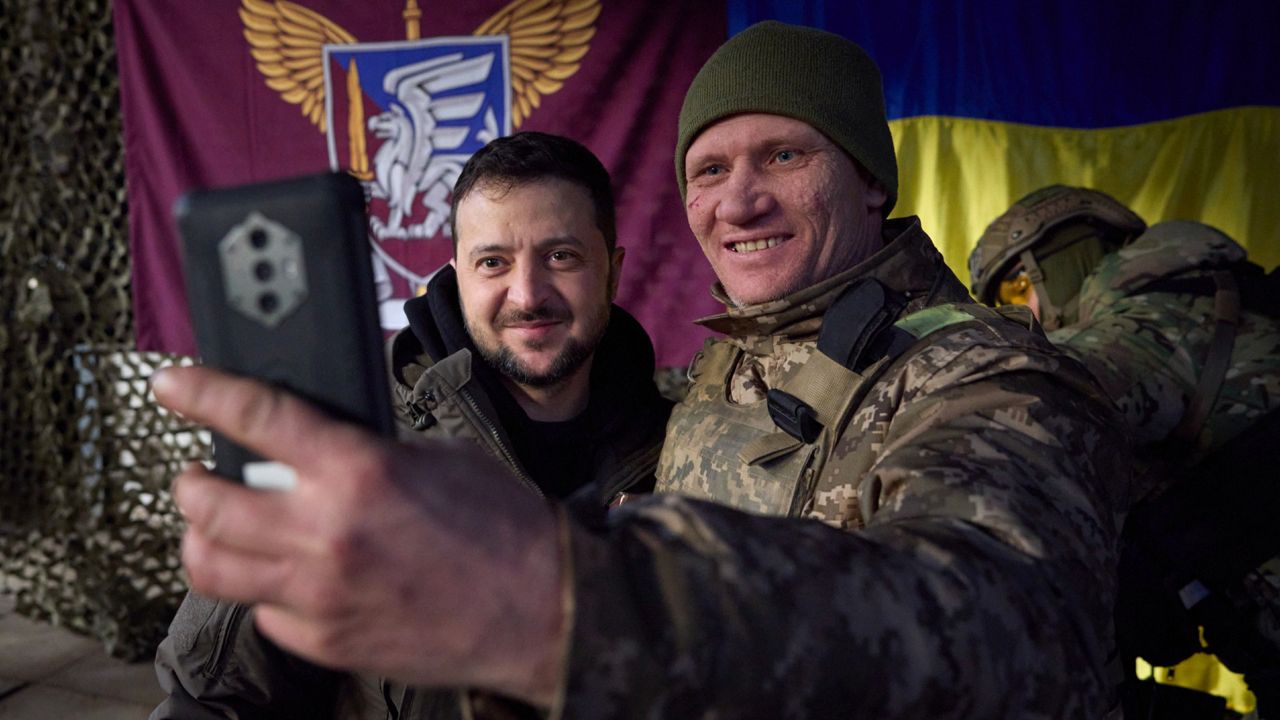In a new display of defiance from Kyiv, Ukrainian President Volodymyr Zelenskyy traveled to an eastern city near the front line Tuesday while two more strategic sites inside Russia were reportedly hit by drone attacks.
What You Need To Know
- In a new display of defiance from Kyiv, Ukrainian President Volodymyr Zelenskyy has traveled to an eastern city near the front line, while two more strategic sites inside Russia have reportedly been hit by drone attacks
- A fire blamed on a drone attack broke out at an airport in Russia's southern Kursk region that borders Ukraine, the region's governor said Tuesday
- In a second incident, an industrial plant was also targeted by drones, Russian independent media reported
- A day earlier, Moscow blamed Kyiv for drone strikes on two air bases deep inside Russia and launched another wave of missile strikes on Ukrainian territory
A fire blamed on a drone attack broke out at an airport in Russia's southern Kursk region that borders Ukraine, the region's governor said Tuesday. In a second incident, an industrial plant 80 kilometers (50 miles) from the Ukrainian border was also targeted by drones, Russian independent media reported, apparently missing a fuel depot at the site.
The strikes were carried out a day after Moscow blamed Kyiv for unprecedented drone attacks on two air bases deep inside Russia, and carried out another wave of missile strikes on Ukrainian territory.
Marking Ukraine's armed forces day, Zelenskyy traveled to the eastern Donetsk region and vowed to push Russian forces out of all of Ukraine's territory.
"Everyone sees your strength and your skill. ... I'm grateful to your parents. They raised real heroes," Zelenskyy said in a video address to Ukrainian forces from the city of the Sloviansk, a key Ukrainian stronghold in the east.
Ukrainian officials have not formally confirmed carrying out the drone attacks, maintaining their apparent policy of deliberate ambiguity as they have done in the past when it comes to high-profile attacks on Russian targets.
But presidential adviser Mikhail Podolyak taunted Moscow in comments on Twitter.
"If something is launched into other countries' airspace, sooner or later unknown flying objects will return to the point of departure," Podolyak wrote. "The earth is round."
The attacks on Russian bases — more than 500 kilometers (300 miles) from the border with Ukraine — exposed the vulnerability of some of Russia's most strategic military sites, raising questions about the effectiveness of their air defenses. They also threatened a major escalation of the nine-month war. One of the airfields houses bombers capable of carrying nuclear weapons.
Russia's Defense Ministry said three Russian servicemen were killed and four others wounded by debris, and that two aircraft were slightly damaged.
The ministry didn't say where the drones had originated. But Russian military bloggers said they likely were launched by Ukrainian scouts, and argued that the strikes had inflicted serious reputational damage on Moscow.
The attacks on the Engels base in the Saratov region on the Volga River and the Dyagilevo base in the Ryazan region in western Russia were part of Ukraine's efforts to curtail Russia's long-range bomber force, the ministry said.
The Engels base hosts Tu-95 and Tu-160 nuclear-capable strategic bombers that have been involved in strikes on Ukraine. Dyagilevo houses tanker aircraft used for mid-air refueling.
In a daily intelligence update on the war in Ukraine, Britain's Defense Ministry said Russia was likely to consider the base attacks as "some of the most strategically significant failures of force protection since its invasion of Ukraine."
It said the bombers would likely be dispersed to other airfields.
Kremlin spokesman Dmitry Peskov said that Russian authorities will "take the necessary measures" to enhance protection of key facilities in view of the latest Ukrainian attacks.
Speaking in a conference call with reporters Tuesday, Peskov said that "the Ukrainian regime's course for continuation of such terror attacks poses a threat."
Peskov reaffirmed that Russia sees no prospects for peace talks now, adding that "the Russian Federation must achieve its stated goals."
Russia, meanwhile, maintained intense attacks on Ukrainian territory, shelling towns overnight near the Zaporizhzhia nuclear power plant that left more than 9,000 homes without running water, local Ukrainian officials said.
The towns lie across the Dnieper river from the nuclear plant, which was seized by Russian forces in the early stages of the war. Russia and Ukraine have for months accused each other of shelling at and around the plant.
The head of Ukraine's northern Sumy region, which borders Russia, said that Moscow launched over 80 missile and heavy artillery attacks on its territory. Governor Dmytro Zhyvytsky said the strikes damaged a monastery near the border town of Shalyhyne.
Ukrainian air force spokesman Yurii Ihnat said the country's ability to shoot down incoming missiles is improving, noting there had been no recent reports of Iranian-made attack drones being used on Ukrainian territory.
He refused to comment on damage caused at the two Russian air bases, adding: "We will have to wait for satellite photos and open-source information."



